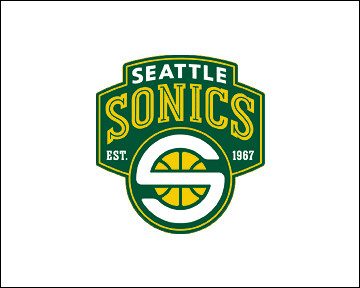NBA approve sale of SuperSonics
(AFP)
Updated: 2006-10-25 08:40
SEATTLE, United States - The National Basketball Association board of
governors approved the sale of the SuperSonics to an Oklahoma group that has
vowed to seek a way to keep the team in Seattle.

The National Basketball Association
board of governors approved the sale of the SuperSonics to an Oklahoma
group that has vowed to seek a way to keep the team in Seattle.
[AFP] |
The 350 million-dollar sale includes the SuperSonics and the WNBA's Storm
from coffee magnate Howard Schultz to an investment group led by Clay Bennett.
The sale, which required a three-quarters majority from the board of
governors, becomes official on October 31.
"We appreciate the support of the Board of Governors and we are honored to
become a member of the NBA," Bennett said in a release. "We are excited about
owning one of the outstanding franchises in sports in one of America's greatest
cities. We are looking forward with great anticipation to the 40th anniversary
season of the Sonics."
The Sonics, a fixture in Seattle since 1967, have been looking for a new
arena for some time.
Schultz was unable to come to an agreement with city officials on the amount
of public funding he wanted for a facility to replace KeyArena.
Refurbished through public funding in 1994, KeyArena is smaller than some of
the NBA's newer venues and has a revenue sharing agreement with the city that is
unfavorable to the team.
Bennett, the chairman of investment group Dorchester Capital, said when the
initial agreement was reached in July that he would do all he could to keep the
team in the Seattle area, including the possibility of an outlying suburb.
"The Board of Governors felt overwhelmingly that Clay is the right person to
lead these extraordinary franchises into the future," NBA commissioner David
Stern said. "I fully recognize Clay's commitment to keeping the Sonics and Storm
in Seattle, and we will do everything we can to support those efforts."
Schultz, who owns Starbucks Coffee, bought the team from Barry Ackerley in
2001 and claimed to have lost 60 million dollars during his
ownership.
|